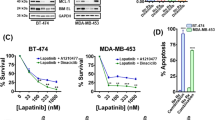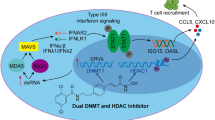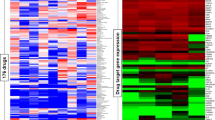Abstract
Current therapies used in the treatment of breast cancer are limited by systemic toxicity, rapid drug metabolism and intrinsic and acquired drug resistance. We have previously shown that adenoviral-mediated transfer of the melanoma differentiation-associated gene-7 (mda-7) elicits growth inhibition and apoptosis in various tumor types. Here, we evaluate the effects of Ad-mda7, alone and in combination with other therapies, against a panel of nine breast tumor cell lines and their normal counterparts; we report selective Ad-mda7-mediated p53-independent growth inhibition, G2/M cell cycle arrest, and apoptosis. In vivo, Ad-mda7 induced p53-independent tumor growth inhibition (P<0.004) in multiple xenograft models. We then evaluated the combination of Ad-mda7 with agents commonly used to treat breast cancer: radiotherapy (XRT), Tamoxifen, Taxotere, Adriamycin, and Herceptin. These agents exhibit diverse modes of action, including formation of bulky adducts, inhibition of DNA replication (Adriamycin, XRT), damage to microtubules (Taxotere), nonsteroidal estrogen antagonists (Tamoxifen), or Her2/neu receptor blockade (Herceptin). Treated with conventional anticancer drugs or radiation, MDA-7-expressing cells display additive or synergistic cytotoxicity and apoptosis that correlates with decreased BCL-2 expression and BAX upregulation. In vivo, animals that received Ad-mda7 and XRT underwent significant reduction of tumor growth (P<0.002). This is the first report of the synergistic effects of Ad-mda7 combined with chemotherapy or radiotherapy on human breast carcinoma cells.
This is a preview of subscription content, access via your institution
Access options
Subscribe to this journal
Receive 12 print issues and online access
$259.00 per year
only $21.58 per issue
Buy this article
- Purchase on Springer Link
- Instant access to full article PDF
Prices may be subject to local taxes which are calculated during checkout







Similar content being viewed by others
References
Winer E, Morrow M, Osborne CK, Harris J . Malignant tumors of the breast. In: Devita Jr S, Hellman S, Rosenberg SA (eds). Cancer: Principles and Practice of Oncology. 6th edn. VT Lippincott-Raven Publishers: Philadelphia, PA. 2000, pp 1651–1716.
Fisher B, Dignam J, Wolmark N, DeCillis A, Emir B, Wickerham DL et al. Tamoxifen and chemotherapy for lymph-node negative, estrogen receptor-positive breast cancer. J Natl Cancer Inst 1997; 89: 1673–1682.
Amat S, Bougnoux P, Penault-Llorca F, Fetissof F, Cure H, Kwiatkowski F et al. Neoadjuvant docetaxel for operable breast cancer induces a high pathological response and breast-conservation rate. Br J Cancer 2003; 88: 1339–1345.
Bonnadona G . Karnofsky memorial lecture. Conceptual and practical advances in the management of breast cancer. J Clin Oncol 1989; 7: 1380–1397.
Tantivejkul K, Vucenik I, Eiseman J, Shamsuddin AM . Inositol hexaphosphate (IP6) enhances the anti-proliferative effects of adriamycin and tamoxifen in breast cancer. Breast Cancer Res Treat 2003; 79: 301–312.
Pegram MD, Konecny GE, O’Callaghan C, Beryt M, Pietras R, Slamon DJ . Rational combinations of trastuzumab with chemotherapeutic drugs used in the treatment of breast cancer. J Natl Cancer Inst 2004; 96: 739–749.
Van’t Veer LJ, Dai H, Van de Vijver MJ, He YD, Hart AA, Mao M et al. Gene expression profilin predicts clinical outcome of breast cancer. Nature 2002; 415: 530–536.
Dive C . Avoidance of apoptosis as a mechanism of drug resistance. J Intern Med Suppl 1997; 740: 139–145.
Reed JC . Mechanisms of apoptosis avoidance in cancer. Curr Opin Oncol 1999; 11: 68–75.
Jiang H, Lin JJ, Su Z-A, Goldstein NI, Fisher PB . Subtraction hybridization identifies a novel melanoma differentiation associated gene, mda-7, modulated during human melanoma differentiation, growth and progression. Oncogene 1995; 11: 2477–2486.
Mhashilkar AM, Schrock RD, Hindi M, Liao J, Sieger K, Kourouma F et al. Melanoma differentiation associated gene-7 (mda-7): a novel anti-tumor gene for cancer gene therapy. Mol Med 2001; 7: 271–282.
Su A-A, Madireddi MT, Lin JJ, Young CSH, Kitada S, Reed JC et al. The cancer growth suppressor gene mda-7 selectively induces apoptosis in human breast cancer cells and inhibits tumor growth in nude mice. Proc Natl Acad Sci USA 1998; 95: 14400–14405.
Saeki T, Mhashilkar A, Chada S, Branch C, Roth JA, Ramesh R . Tumor-suppressive effects by adenovirus-mediated mda-7 gene transfer in non-small cell lung cancer in vitro. Gene Therapy 2000; 7: 2051–2057.
Chada S, Sutton RB, Ekmekcioglu S, Ellerhorst JA, Mumm JB, Leitner WW et al. MDA-7/IL-24 is a unique cytokine-tumor suppressor in the IL-10 family. Int Immunopharmacol 2004; 4: 649–667.
Saeki T, Mhashilkar A, Swanson X, Zumstein L, Branch C, Roth JA et al. Inhibition of human lung cancer growth following adenovirus-mediated mda-7 gene expression in vivo. Oncogene 2002; 21: 4558–4566.
Lebedeva IV, Su Z-Z, Chang Y, Kitada S, Reed JC, Fisher PB . The cancer growth suppressing gene mda-7 induces apoptosis selectively in human melanoma cells. Oncogene 2002; 21: 708–718.
Mhashilkar AM, Stewart AL, Sieger K, Yang HY, Khimani AH, Ito I et al. MDA-7 negatively regulates the beta-catenin and PI3K signaling pathways in breast and lung tumor cells. Mol Ther 2003; 8: 207–219.
Nishikawa T, Munshi A, Story MD, Ismail S, Stevens C, Chada S et al. Adenoviral-mediated mda-7 expression suppresses DNA repair capacity and radiosensitizes non-small-cell lung cancer cells. Oncogene 2004; 23: 7125–7131.
Pataer A, Vorburger SA, Barber GN, Chada S, Mhashilkar AM, Zou-Yang H et al. Adenoviral transfer of the melanoma differentiation-associated gene 7 (mda7) induces apoptosis of lung cancer cells via up-regulation of the double-stranded RNA-dependent protein kinase (PKR). Cancer Res 2002; 62: 2239–2243.
Pataer A, Chada S, Hunt KK, Roth JA, Swisher SG . Adenoviral melanoma differentiation-associated gene 7 induces apoptosis in lung cancer cells through mitochondrial permeability transition-independent cytochrome c release. J Thor Cardiovasc Surg 2003; 125: 1328–1335.
McKenzie T, Liu Y, Fannale M, Swisher SG, Chada S, Hunt KK . Combination therapy of Ad-mda7 and trastuzumab increases cell death in Her-2/neu-overexpressing breast cancer cells. Surgery 2004; 136: 437–442.
Chada S, Mhashilkar AM, Ramesh R, Mumm JB, Sutton RB, Bocangel D et al. Bystander activity of Ad-mda7: human MDA-7 protein kills melanoma cells via an IL-20 receptor-dependent but STAT3-independent mechanism. Mol Ther 2004; 10: 1085–1095.
Ramesh R, Mhashilkar AM, Tanaka F, Saito Y, Branch CD, Sieger K et al. Melanoma differentiation-associated gene 7/interleukin (IL)-24 is a novel ligand that regulates angiogenesis via the IL-22 receptor. Cancer Res 2003; 63: 5105–5113.
Pegram MD, Konecny G, Slamon DJ . The molecular and cellular biology of HER2/neu gene amplification/overexpression and the clinical development of herceptin (trastuzumab) therapy for breast cancer. Cancer Treat Res 2000; 103: 57–75.
Tan SL, Katze MG . The emerging role of the interferon-induced PKR protein kinase as an apoptotic effector: a new face of death? J Interferon Cytokine Res 1999; 19: 543–554.
Saunders LR, Barber GN . The dsRNA binding protein family: critical roles, diverse cellular functions. FASEB 2003; 17: 961–983.
Pataer A, Vorburger SA, Chada S, Balachandran S, Barber GN, Roth JA et al. Melanoma differentiation-associated gene-7 protein physically associates with the double-stranded RNA activated protein kinase PKR. Mol Ther 2005; 11: 717–723.
Bargou RC, Daniel PT, Mapara MY, Bommert K, Wagener C, Kallinich B et al. Expression of the bcl-2 gene family in normal and malignant breast tissue: low bax-alpha expression in tumor cells correlates with resistance towards apoptosis. Int J Cancer 1995; 60: 854–859.
Parton M, Krajewski S, Smith I, Krajewska M, Archer C, Naito M et al. Coordinate expression of apoptosis-associated proteins in human breast cancer before and during chemotherapy. Clin Cancer Res 2002; 8: 2100–2108.
Tong AW, Nemunaitis J, Su D, Zhang Y, Cunningham C, Senzer N et al. Intratumoral injection of INGN 241, a nonreplicating adenovector expressing the melanoma-differentiation associated gene-7 (mda-7/IL24): biologic outcome in advanced cancer patients. Mol Ther 2005; 11: 160–172.
Cunningham CC, Chada S, Merritt JA, Tong AW, Senzer N, Zhang Y et al. Clinical and local biological effects of an intratumoral injection of mda-7 (IL24; INGN 241) in patients with advanced carcinoma: a phase I study. Mol Ther 2005; 11: 149–159.
Oida Y, Gopalan B, Miyahara R, Inoue S, Branch CD, Mhashilkar AM et al. Sulindac enhances adenoviral vector expressing mda-7/IL-24-mediated apoptosis in human lung cancer. Mol Cancer Therapeutics 2005; 4: 291–304.
Nishikawa T, Ramesh R, Chada S, Meyn RE . Adenovirus-mediated mda-7 (IL24) gene therapy suppresses angiogenesis and sensitizes NSCLC xenograft tumors to radiation. Mol Ther 2004; 9: 818–828.
Su Z-Z, Lebedeva IV, Sarkar D, Gopalkrishnan RV, Sauane M, Sigmon C et al. Adenovirus-mediated mda-7 (IL24) gene therapy suppresses angiogenesis and sensitizes NSCLC xenograft tumors to radiation. Oncogene 22; 2003: 1164–1180.
Yacoub A, Mitchell C, Lister A, Lebedeva IV, Sarkar D, Su ZZ et al. Melanoma differentiation-associated 7 (interleukin 24) inhibits growth and enhances radiosensitivity of glioma cells in vitro and in vivo. Clin Cancer Res 2003; 9: 3272–3281.
Kokkinakis DM, Liu X, Chada S, Ahmed MM, Shareef MM, Singha UK et al. Modulation of gene expression in human central nervous system tumors under methionine deprivation-induced stress. Cancer Res 2004; 64: 7513–7525.
Sieger KA, Mhashilkar AM, Stewart A, Sutton RB, Strube RW, Chen SY et al. The tumor suppressor activity of MDA-7/IL-24 is mediated by intracellular protein expression in NSCLC cells. Mol Ther 2004; 9: 355–367.
Chada S, Bocangel D, Ramesh R, Grimm EA, Mumm JB, Mhashilkar AM et al. Mda7 kills pancreatic cancer cells by inhibition of the Wnt/PI3K signaling pathways: evidence of IL-20 receptor mediated bystander activity against pancreatic cancer. Mol Ther 2005; 11: 724–733.
Ramesh R, Ito I, Gopalan B, Saito Y, Mhashilkar A, Chada S . Ectopic production of MDA-7/IL-24 inhibits invasion and migration of human lung cancer cells. Mol Ther 2004; 9: 510–518.
Ramesh R, Ito I, Miyahara R, Saito Y, Gopalan B, Wu Z et al. Local and systemic inhibition of lung tumor growth after nanoparticle-mediated mda-7/IL-24 gene delivery. DNA Cell Biol 2004; 23: 850–857.
Caudell E, Mumm J, Poindexter N, Ekmekcioglu S, Mhashilkar A, Yang X-H et al. The protein product of the tumor suppressor gene, melanoma differentiation-associated gene 7, exhibits immunostimulatory activity and is designated IL-24. J Immunol 2002; 168: 6041–6046.
Acknowledgements
This work was supported by NCI Grants CA89778, CA88421, CA102716 (RR) and CA097598 (SC); PO1 CA06294 (REM) the Texas Higher Education Coordinating Board ATP/ARP Grant 003657-0078-2001 (RR), by Institutional Research Grant (RR), and by WM Keck Gene Therapy Grant (RR); The University of Texas MD Anderson Cancer Center Support Core Grant (CA 16672) (KKH); The Shooting Down Cancer Fund (MD Anderson Cancer Center: KKH); The Cheryl Burguieres Memorial Breast Cancer Fund (MD Anderson Cancer Center: KKH), and a sponsored research agreement with Introgen Therapeutics, Inc., The Homer Flower Gene Therapy Research Fund (SGS).
Author information
Authors and Affiliations
Corresponding author
Rights and permissions
About this article
Cite this article
Chada, S., Mhashilkar, A., Liu, Y. et al. mda-7 gene transfer sensitizes breast carcinoma cells to chemotherapy, biologic therapies and radiotherapy: correlation with expression of bcl-2 family members. Cancer Gene Ther 13, 490–502 (2006). https://doi.org/10.1038/sj.cgt.7700915
Received:
Revised:
Accepted:
Published:
Issue Date:
DOI: https://doi.org/10.1038/sj.cgt.7700915
Keywords
This article is cited by
-
Mesenchymal stem cells derived from iPSCs expressing interleukin-24 inhibit the growth of melanoma in the tumor-bearing mouse model
Cancer Cell International (2020)
-
Expression, Purification, and Polyethylene Glycol Site-Specific Modification of Recombinant Human Interleukin 24 in Escherichia coli
The Protein Journal (2019)
-
A combinatory use of adenoviruses expressing melanoma differentiation-associated gene-7 and replication-competent adenoviruses produces synergistic effects on pancreatic carcinoma cells
Tumor Biology (2015)
-
Combination of adenoviruses expressing melanoma differentiation-associated gene-7 and chemotherapeutic agents produces enhanced cytotoxicity on esophageal carcinoma
Cancer Gene Therapy (2014)
-
Molecular targets and signaling pathways regulated by interleukin (IL)-24 in mediating its antitumor activities
Journal of Molecular Signaling (2013)



